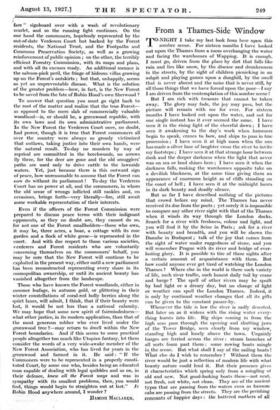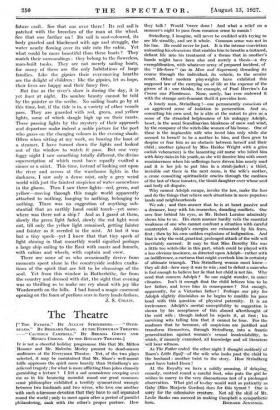From a Thames-Side Window T O-NIGHT I take my last look
from here upon this sombre scene. For sixteen months I have looked out upon the Thames from a room overhanging the water and facing the warehouses of Wapping. It is enough. I must go, driven from the place by dirt that falls like rain and lies like snow, by the disease and drunkenness in the streets, by the sight of children picnicking in an ashpit and playing games upon a dunghill, by the smell that is never absent and the noise that is never still, by all those things that we have forced upon the poor—I say I am driven from the contemplation of this sombre scene !
But I am rich with treasure that cannot be taken away. The glory may fade, the joy may pass, but the picture will remain with me for ever. For sixteen months I have looked out upon the water, and not for one single instant has it ever seemed the same. I have seen it in the rising light of the cheerful dawn ; I have seen it awakening to the day's work when hammers begin to speak, cranes to bow, and ships to pass in fine procession ; I have seen it at high noon when the sun has made a silver lane of laughter cross the river to invite my footsteps ; I have seen it at that strange hour between dusk and the deeper darkness when the light that never was on sea or land shines here ; I have seen it when the darkness falls, making the warehouses opposite take on a devilish blackness, at the same time giving them an appearance of enormous height as of cliffs standing on the coast of hell ; I have seen it at the midnight hours in its dark beauty and deadly silence.
But so far I have described nothing of the pictures that crowd before my mind. The Thames has never received its due from the poets ; yet surely it is impossible to compare any other river sight with that of the Thames when it winds its way through the London docks. Search for a river with freshness, colour and light, and you will find it by the Seine in Paris ; ask for a river with beauty and breadth, and you will be shown the Danube in Budapest ; talk of the joy that comes from the sight of water under ruggedness of stone, and you will remember Prague with its river and bridge of ever- lasting glory. It is possible to tire of these sights after a certain amount of acquaintance with them. But how could anyone ever get tired of watching the London Thames ? Where else in the world is there such variety of life, such river traffic, such honest daily toil by crane and barge ? The spell of other rivers may be spoilt by bad light or a dreary day, but no change of light or weather can spoil the London Thames. Indeed, it is only by continual weather changes that all its gifts can be given to the constant passer-by.
Whenever the tide is low the river is sadly deserted. But later on as it widens with the rising water every- thing bursts into life. Big ships coming in from the high seas pass through the opening and shutting jaws of the Tower Bridge, seen clearly from my window, standing high and lonely above the town. Ungainly barges are ferried across the river : steam launches of all sorts foam past them : some rowing boats mingle in the scene. But what shall I say of the sailing boats What else do I wish to remember ? Without them the river would be just a reflection of modern life with what beauty nature could lend it. But their presence gives it characteristics which spring only from a mingling of old and new. Not good-looking boats these—not neat, not fresh, not white, not clean. They are of the ancient types that are passing from the waters even as hansom cabs are passing from, the streets. They are the perishing remnants of happier days ; the battered mothers of ail future craft. See that one over there ! Its red sail is patched with the breeches of the than at the..wheel. See that one farther on ! Its sail is soot-coloured, its body gnarled and blackened with age and struggle, the water nearly flowing over its side into the cabin. Yet what could be more beautiful than these boats ? They match their. surroundings : they belong to the flowerless, man-built tanks. They are not merely sailing boats, for many of them are the only habitations of large families. Like the gipsies their ever-moving hearths are the delight of children : like the gipsies, let us hope, their lives are happy and their fancy free: ' But fine as the river's show is during the day, it is yet finer at night. Its sombre beauty cannot be told by the painter or the scribe. No sailing boats go by at this time, but, if the tide is in, a variety of other vessels pass. They are guarded with red, green, and yellow lights,. some of which dangle high up on their masts. These passing lights by the mystery of their approach • and departure make indeed a noble picture for the 'poet who gazes on the ,changing colours in the evening shade. Often when sitting at my work, on hearing the hoot of a steamer, I have turned down the lights and looked out of the window to watch it pass. But one very -foggy night I saw something totally different, the divine superscription of which must have equally exalted a sinner or a saint. This time, instead of looking out Upon the' river and across at the warehouse 'lights in the darkness, I saw Only a dense mist, only a grey weird World with just the faintest suspicion of Water somewhere in the gloom. Then I saw three lights—red, green, and yellow—moving through this magic world apparently attached to nothing, hanging to nothing, belonging to nothing. There was no suggestion of anything sub- stantial that an 'earthly hand could touch—yet some- where was there not a ship ? And as I gazed at them, Slowly the green 'light faded, slowly the red light went out, till only the yellow light remained, getting fainter and fainter as it receded in the mist. At last it was but a tiny speck—yet I knew that that tiny speck of -light shining in that unearthly world signified perhaps a large 'ship sailing to the East with masts and funnels, with -cabins and wheels, with captain and crew.
' There are some of us . who occasionally deriVe from moments spent alone in the countryside sudden exalta- 'tions of the spirit that are felt to be cleansings of the soul. Yet from this window in Rotherhithe, far from the country and dressed with dirt, the sight that evening was so thrilling as to make me cry aloud with joy like -Wordsworth on the hills. I had found a magic casement opening on the foam of perilous seas in faery lands forlorn.
J. S. COLLI.































 Previous page
Previous page